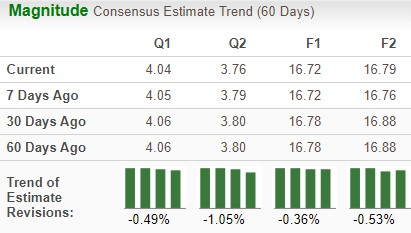
JPMorgan JPM is scheduled to kick-start third-quarter 2024 earnings on Oct. 11. The largest American bank’s earnings draw a lot of attention because of its presence in almost all the finance sector businesses. This, thus, offers insight into how the quarterly performance of other banks is likely to be.
JPMorgan’s close peers – Bank of America BAC and Citigroup C are slated to announce their quarterly numbers on Oct. 15.
JPM’s second-quarter performance was impressive despite industry-wide operating challenges. This time, we believe the company’s performance will likely remain robust. The Zacks Consensus Estimate for third-quarter revenues of $41.01 billion suggests 2.9% year-over-year growth.
On the other hand, rising provisions for credit losses and higher operating expenses are likely to have hampered JPMorgan’s bottom-line growth. In the past seven days, the consensus estimate for earnings for the to-be-reported quarter has been revised marginally lower to $4.04, indicating a 6.7% decline from the prior-year quarter.
Estimate Revision Trend

Image Source: Zacks Investment Research
JPMorgan has an impressive earnings surprise history. The company’s earnings outpaced the Zacks Consensus Estimate in each of the trailing four quarters, with an average beat being 8.38%.
Earnings Surprise History

Image Source: Zacks Investment Research
Major Factors to Impact JPMorgan’s Q3 Performance
Net Interest Income: On Sept. 18, the Federal Reserve cut the interest rates by 50 basis points to 4.75-5% for the first time since March 2020. Nonetheless, the development is not expected to have much impact on JPMorgan’s net interest income (NII) during the third quarter.
Further, relatively higher rates might have hurt NII growth prospects because of elevated funding/deposit costs and an inverted yield curve during the major part of the quarter.
Yet, clarity on the Fed’s rate cut path and the stabilizing macroeconomic backdrop are likely to have provided support to the lending scenario. Per the Fed’s latest data, the demand for commercial and industrial, real estate and consumer loans was modest in the first two months of the quarter.
The Zacks Consensus Estimate for NII (reported) of $22.57 billion suggests a slight decline on a year-over-year basis. Our estimate for NII implies a fall of almost 1% to $22.55 billion.
Investment Banking (IB) Fees: Global mergers and acquisitions (M&As) in the third quarter of 2024 showed marked improvement after subdued 2023 and 2022. This is expected to have supported JPMorgan’s IB fees.
Both deal value and volume were decent during the quarter, driven by solid financial performance, higher chances of a soft landing of the U.S. economy, buoyant markets and interest rate cuts. Yet, tough scrutiny by antitrust regulators and lingering geopolitical issues were headwinds. JPMorgan’s leadership in the space is likely to have offered some support to advisory fees.
On the other hand, the IPO market saw signs of cautious optimism, given the market volatility, geopolitical challenges and global monetary easing. The impressive equity market performance drove some solid activity in follow-up equity issuances. Further, bond issuance volume improved on favorable economic conditions and corporate spreads at near historical lows. Thus, growth in JPM’s underwriting fees (accounting for almost 60% of total IB fees) is expected to have been solid during the to-be-reported quarter.
We project IB revenues (in the Corporate & Investment Banking segment) to be $2.39 billion.
Management expects IB revenues to increase 15% on a year-over-year basis driven by robust debt and equity capital markets, while M&A volumes are expected to be “flattish.”
Markets Revenues: Client activity and market volatility were decent in the third quarter. The likelihood of a soft landing of the U.S. economy, cooling inflation and easing monetary policy drove the client activity. So, JPMorgan is likely to have recorded decent growth in markets revenues (comprising nearly 20% of the company’s total revenues) this time.
Our estimates for equity markets revenues and fixed-income markets revenues stand at $2.26 billion and $5.03 billion, respectively.
Management expects markets revenues to be flat or rise almost 2% given the “very, very strong performance in equities across the franchise” partially offset by “a bit weaker” fixed income performance.
Mortgage Banking Fees: As the central bank lowered the rates, mortgage rates started to come down. The rates declined to almost 6.2% by the end of the third quarter. This resulted in a significant surge in refinancing activities while origination volumes remained subdued. Thus, mortgage banking fees are likely to have witnessed some improvement at JPMorgan, while a record last year’s performance is expected to make comparison challenging.
The consensus estimate for mortgage fees and related income of $322.7 million implies a 22% decrease from the prior-year quarter. Our estimate for the metric stands at $337.6 million.
Expenses: JPMorgan’s plan of entering new markets by opening branches, which is already on track, along with inorganic expansion efforts, is likely to have resulted in an increase in operating expenses in the third quarter. Also, investments in technology to strengthen digital offerings might have led to higher costs.
Our estimate for non-interest expenses stands at $22.83 billion, implying an increase of 4.9% on a year-over-year basis.
Asset Quality: JPMorgan is likely to have set aside a huge amount of money for potential delinquent loans (mainly commercial loan defaults), given the expectations of an economic slowdown. Our estimate for provision for credit losses is pegged at $2.44 billion.
The Zacks Consensus Estimate for non-performing loans (NPLs) of $7.96 billion implies a 5.9% increase year over year. The consensus estimate for non-performing assets (NPAs) of $8.69 billion suggests a 6.8% rise. Our estimates for NPAs and NPLs are pegged at $8.29 billion and $7.66 billion, respectively.
What Our Model Unveils for JPMorgan
Per our proven model, the chances of JPMorgan beating estimates this time are low. The combination of a positive Earnings ESP and a Zacks Rank #1 (Strong Buy), 2 (Buy) or 3 (Hold) increases the odds of an earnings beat. That is not the case here, as you can see below.
JPMorgan has an Earnings ESP of -0.25%.
JPM carries a Zacks Rank #3 at present.
JPM’s Price Performance & Premium Valuation
JPMorgan was among the top five performing banks on the S&P 500 Index in the first nine months of 2024. The stock outperformed the industry and the S&P 500 Index. Additionally, shares of JPM are trading well above its close peers – BAC and C.
Price Performance

Image Source: Zacks Investment Research
JPM stock is not so cheap, as the Value Score of F suggests a stretched valuation at this moment.
In terms of the forward 12-month Price/Earnings, JPM is trading at 12.25X, higher than the industry’s 11.28X.
Price-to-Earnings (forward 12 Months)

Image Source: Zacks Investment Research
How to Play JPM Stock Now?
JPMorgan is well-poised to benefit from its scale and size, and leverage its leading position in several businesses. The acquisition of First Republic Bank last year continues to support its financials.
JPMorgan is expanding its footprint in new regions and plans to capitalize on cross-selling opportunities. While such expansion plans will lead to higher investment-related expenses, they bode well for the company’s long-term prospects and will provide it an edge over its peers.
During the third quarter, JPM increased its quarterly dividend for the second time this year as it cleared the 2024 stress test. The company also authorized a new share repurchase program.
Yet, the volatile nature of the capital markets business will likely keep JPM’s fee income growth challenging. The stock’s high valuation and bearish analyst stance as the company warned of lower NII next year because of rate cuts weigh on it.
Investors must check out management comments regarding next year’s NII prospects on the third-quarter 2024 conference call before making any investment decision. So, they should consider these factors carefully and evaluate their risk tolerance before buying JPM stock. Those who already own the stock can hold on to it because it is less likely to disappoint over the long term.
© 2024 Benzinga.com. Benzinga does not provide investment advice. All rights reserved.


